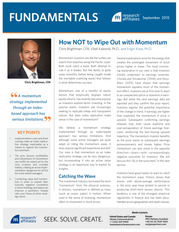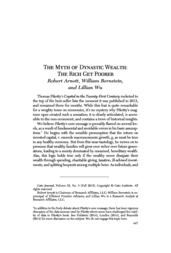Description
only 5% + 15% 2 = 7.25%, or about one-third as much. This
difference is not visible to portfolio analysts who rely exclusively on total turnover.
5
Selecting the universe that corresponds to the capweighted benchmark would usually make the weight ratios
more meaningful.
6
This approximation assumes that prices follow a normal
(not log-normal) distribution; clearly, it won’t work well if
the volatility is sufficiently high. In addition, the stocks that
moved down in price by a large amount are more likely to be
deleted, further lessening the precision of the estimate.
7
Weighted-average market capitalization is defined
WAMC = ∑ S ∈P
∑ S∈P wSCS . Here, MC is the
market capitalization (of either individual stocks s or the
entire portfolio P), and c s is the cap weight of stock s in
portfolio P.
8
In fact, we need the weaker but more complex assumption that the turnover is uncorrelated with certain weightrelated measures; however, for our purposes the simpler one
will do.
9
Effective turnover will be bounded by turnover (TO)
and the square of turnover (TO2 ).
In this case we are assuming that trades occur mainly due to replacement of securities rather than rebalancing across portfolios. 10 See Arnott et al. [2005]. 11 See Zanona [2013]. REFERENCES Gatheral, J. “No-Dynamic-Arbitrage and Market Impact.” Working Paper #2008-6, New York University Mathematics in Finance, 2008. Huberman, G., and W.
Stanzl. “Price Manipulation and Quasi-Arbitrage.” Econometrica, Vol. 74, No.
4 ( July 2004), pp. 1247-1276. Johansson, K.K., and T. Pekkala.
“Portfolio Capacity.” Working paper, 2013. Kyle, A.S. “Continuous Auctions and Insider Trading.” Econometrica, Vol. 53, No.
6 (November 1985), pp. 1315-1335. Madhavan, A. “Market Microstructure: A Survey.” Journal of Financial Markets, Vol.
3, No. 3 (August 2000), pp. 205-258. ——. “The Russell Reconstitution Effect.” Financial Analysts Journal, Vol.
59, No. 4 ( July/August 2003), pp. 51-64. Schultz, P.
“Downward-Sloping Demand Curves, the Supply of Shares, and the Collapse of Internet Stock Prices.” Journal of Finance, Vol. 63, No. 1 (February 2008), pp.
351-378. Shleifer, A. “Do Demand Curves for Stocks Slope Down?” Journal of Finance, Vol. 41, No.
3 ( July 1986), pp. 579-590. Almgren, R., C. Thum, E.
Hauptmann, and H. Li. “Equity Market Impact.” Risk, July 2005, pp.
57-62. Zanona, M. “Index Assets Up 18.4% for Year; Total Worldwide Tops $7 Trillion.” Pensions & Investments, September 16, 2013. Arnott, R.D., J. Hsu, and P.
Moore. “Fundamental Indexation.” Financial Analysts Journal, Vol. 61, No.
2 (March/April 2005), pp. 83-99. To order reprints of this article, please contact Dewey Palmieri at dpalmieri@ iijournals.com or 212-224-3675. THE M ARKET I MPACT OF PASSIVE T RADING JOT-AKED.indd 12 SUMMER 2015 6/13/15 8:43:52 AM .
In this case we are assuming that trades occur mainly due to replacement of securities rather than rebalancing across portfolios. 10 See Arnott et al. [2005]. 11 See Zanona [2013]. REFERENCES Gatheral, J. “No-Dynamic-Arbitrage and Market Impact.” Working Paper #2008-6, New York University Mathematics in Finance, 2008. Huberman, G., and W.
Stanzl. “Price Manipulation and Quasi-Arbitrage.” Econometrica, Vol. 74, No.
4 ( July 2004), pp. 1247-1276. Johansson, K.K., and T. Pekkala.
“Portfolio Capacity.” Working paper, 2013. Kyle, A.S. “Continuous Auctions and Insider Trading.” Econometrica, Vol. 53, No.
6 (November 1985), pp. 1315-1335. Madhavan, A. “Market Microstructure: A Survey.” Journal of Financial Markets, Vol.
3, No. 3 (August 2000), pp. 205-258. ——. “The Russell Reconstitution Effect.” Financial Analysts Journal, Vol.
59, No. 4 ( July/August 2003), pp. 51-64. Schultz, P.
“Downward-Sloping Demand Curves, the Supply of Shares, and the Collapse of Internet Stock Prices.” Journal of Finance, Vol. 63, No. 1 (February 2008), pp.
351-378. Shleifer, A. “Do Demand Curves for Stocks Slope Down?” Journal of Finance, Vol. 41, No.
3 ( July 1986), pp. 579-590. Almgren, R., C. Thum, E.
Hauptmann, and H. Li. “Equity Market Impact.” Risk, July 2005, pp.
57-62. Zanona, M. “Index Assets Up 18.4% for Year; Total Worldwide Tops $7 Trillion.” Pensions & Investments, September 16, 2013. Arnott, R.D., J. Hsu, and P.
Moore. “Fundamental Indexation.” Financial Analysts Journal, Vol. 61, No.
2 (March/April 2005), pp. 83-99. To order reprints of this article, please contact Dewey Palmieri at dpalmieri@ iijournals.com or 212-224-3675. THE M ARKET I MPACT OF PASSIVE T RADING JOT-AKED.indd 12 SUMMER 2015 6/13/15 8:43:52 AM .













